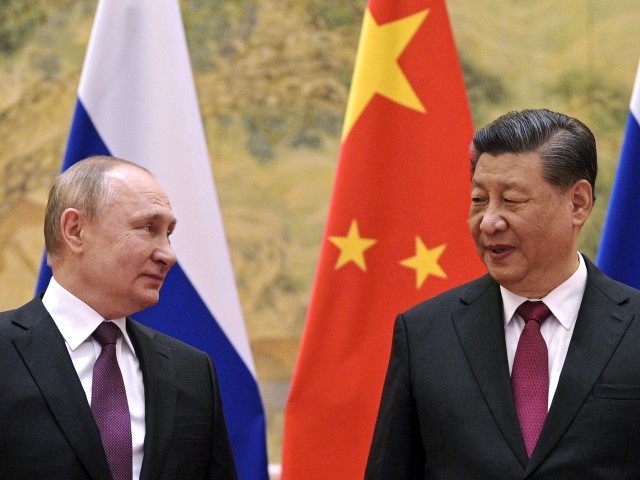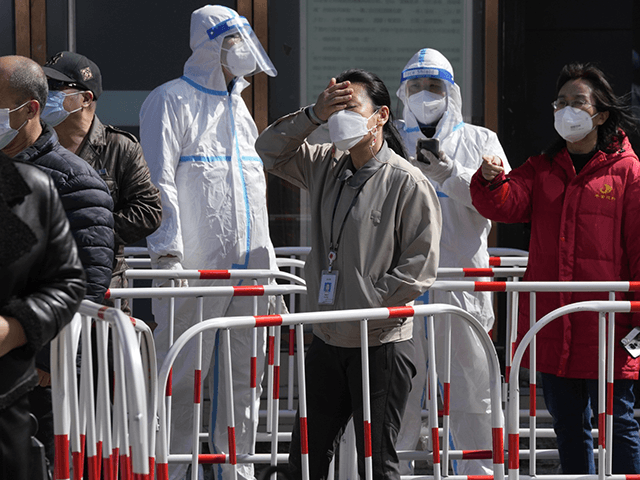China’s state-run Global Times on Sunday frantically tried to convince foreign investors that now is the “right time to bet on China” – right after the Communist government demonstrated it will not hesitate to wipe out billions of dollars in value by turning key cities like Shanghai into coronavirus prison camps at the drop of a hat.
The Global Times gleefully quoted a Friday piece in the Financial Times that said “global investors are returning to the Chinese mainland stock markets after the sell-off earlier this year.”
After boasting about increased activity in the Chinese stock market, the Global Times claimed international markets have accepted the costs of Beijing’s “zero-COVID” policies, and cannot wait to snap up Chinese stocks at fire-sale prices, especially with the Biden administration pushing America’s economy to the edge of recession:
It is true that China’s worst epidemic outbreak in two years, the Russia-Ukraine situation and other factors hurt market sentiment in the past months. Nevertheless, with the continuous improvement of the epidemic prevention and control situation, the accelerated resumption of production in some regions in the country, and the central government’s emphasis on stabilizing economic growth, investors have gradually regained optimism and rationality toward China’s economic recovery and development.
…
Nevertheless, it should be noted that the relatively low price basis of Chinese stocks has offered a prime opportunity for investors to step in. Any investor who believes in valuation may regret missing such an opportunity, especially at a time when major global markets are at risk of significant volatility due to geopolitical factors and the Fed’s policy shift.
In the US, there is growing concern that the Fed’s aggressive plan to curb inflation could lead to a recession, and any negative news now could easily spook investors and trigger a sell-off.
“It will be regrettable if foreign investors miss out on this wave of Chinese investment opportunities,” the Global Times concluded.
The Chinese editorialists apparently failed to read the rest of the Financial Times article, which laid out some specific reasons for the big sell-off – Communist regulatory crackdowns, deranged coronavirus lockdowns, and fears that China could be affected by worldwide sanctions against its ally Russia – and warned investors could bail out again if any of those factors should return.
To date, China has carefully tiptoed around Russia sanctions while refusing to condemn the brutal invasion of Ukraine, which threatens to cause a worldwide food crisis, in addition to the suffering inflicted on Ukrainian civilians. On the other hand, lockdowns and politicized regulatory bullying of high-flying corporations could resume at any moment.

Chinese President Xi Jinping, right, and Russian President Vladimir Putin talk to each other during their meeting in Beijing, China, Friday, Feb. 4, 2022. Alexei Druzhinin, Sputnik, Kremlin Pool Photo via AP
The Financial Times did indeed cite some financial analysts who said there were bargains to be found in the Chinese stock market – but also some who said “caution may be warranted,” because several crises are still brewing:
“The downside risk is that we find when they open up, you don’t get that upside that you’ve seen in other countries,” said Robert St Clair, a strategist at Fullerton Fund Management in Singapore. “The external environment is much weaker.”
In addition, problems in China’s real estate market continue to percolate even as markets’ focus shifts to reopening in Shanghai. On Tuesday, analysts at rating agency Moody’s warned that Chinese developers “continue to experience liquidity stress amid weak sales and tight funding conditions.”
On Tuesday, the Financial Times published an editorial warning China to consider the “sobering implications” of a possible recession and “reconsider not only aspects of its ‘zero-COVID’ policy but also its treatment of foreign direct investors.”
The editors cited surveys that showed “rising disillusionment among foreign investors, many of whom plan to shift investment out of China,” and not just because those notorious coronavirus lockdowns could be reimposed at any moment, without warning.
The bigger problem is that foreign corporations are increasingly concerned with the overhead, risks, and bureaucratic frustrations of doing business in China:
While the US screens some selected investments through the Committee on Foreign Investment in the US (Cfius), would-be investors in China must navigate a labyrinth. They must check the business they wish to start is not on either of two negative lists and then seek regulatory approval if it falls into one of a further 550-plus different categories.
Once a foreign business is up and running, it may receive pressure to transfer technology to Chinese counterparts, sometimes as part of the “Made in China 2025” strategy, which envisages boosting the market share of domestic competitors over time. Under the Foreign Investment Law of 2020, a national security review may be required for a project that “affects or may affect national security”. Other recent laws have added to the complexity. The Data Security Law and Personal Information Protection Law, both passed last year, sharply restrict the handling of customer data and its transfer overseas.
The Financial Times noted American and European analysts are predicting a significant decline in foreign investment in China over the next few years unless Beijing takes steps to “alleviate some of the gloom descending upon China’s foreign business community” by cutting red tape, pulling back from zero-COVID mania, and reassuring investors their assets will not be treated cavalierly by Communist mandarins.

Health workers in protective gear walk out from a blocked off area after spraying disinfectant in Shanghai’s Huangpu district on January 27, 2021. (Photo by STR/AFP via Getty Images)
The Economist bluntly stated in May that “foreign investors are fleeing China” because they fear a “grand policy disaster,” such as the one-two punch of more coronavirus lockdowns coupled with a potential housing market collapse.
The Economist surveyed the damage wrought by dictator Xi Jinping’s policies:
They have knocked $2trn from Chinese shares listed in Hong Kong and New York. Chinese initial public offerings in these two cities have nearly ground to a halt this year. China’s property firms have sold just $280m in high-yield dollar bonds so far in 2022, down from $15.6bn during the same period last year, according to Dealogic, a data provider. Within China, the value of yuan-denominated financial assets held by foreigners fell by more than 1trn yuan ($150bn) in the first three months of 2022, the biggest drop ever. The Institute of International Finance (iif), a bankers’ group in Washington, forecasts that a total of $300bn in capital will flow out of the country this year, up from $129bn in 2021.
Analysts said the market is simply “waking up” to how risky the Chinese market has become as Xi’s regime grows more “ideologically inflexible” – and more aggressive, as with its threats to attack Taiwan.
The debate between market optimists and pessimists could be settled by the Communist Party Congress this fall. The Economist suggested optimists view Xi’s “gloomy period of ideology, policy missteps, and beleaguered growth” as preparation for the political struggle of the Congress. Once that struggle is over, “pragmatists will have more control of policy” and the threat of more madcap coronavirus lockdowns will recede.
Pessimists, on the other hand, think there will be little change after the Party Congress because Xi is “serious” about his agenda, and China’s “future will be far more ideological,” with policy shocks hammering key markets for years to come.

COMMENTS
Please let us know if you're having issues with commenting.